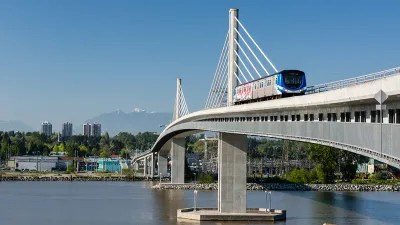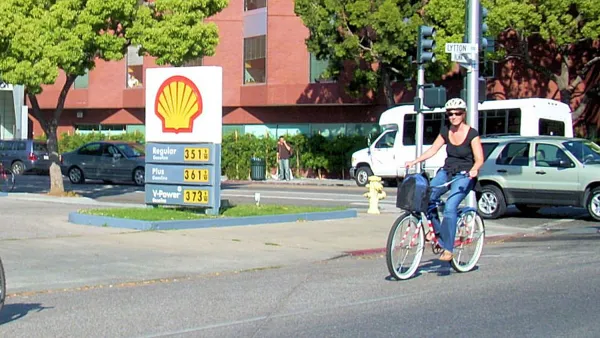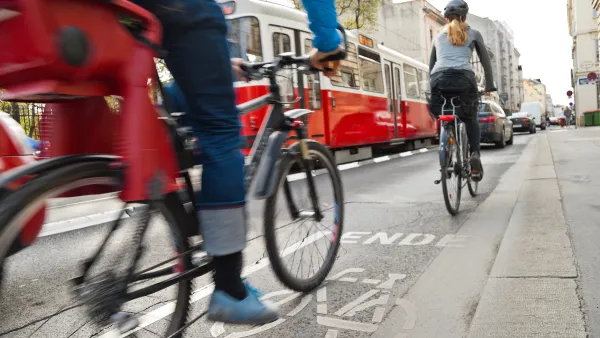Emily Badger, Washington Post Journalist; Peter Newman, sustainability author and professor in Perth; and Robert Puentes of Eno Center discuss the changes in transportation planning now that car trips are on the wane in urban centers.

Guest host USA TODAY reporter Susan Page and her three guests "discuss how cities are steering away from car-based planning and what it means for how we live and work," states the introduction to this 48-minute talk show that takes call-ins and emails from those listening live to the nationally broadcasted, Washington, D.C. radio show. The full transcript is also available.
Guests
- Emily Badger, reporter covering urban policy, The Washington Post's Wonkblog. [Tagged here.]
- Robert Puentes, president and CEO, Eno Center for Transportation, previously with Brookings. [Tagged here.]
- Peter Newman, author, "The End of Automobile Dependence: How Cities are Moving Beyond Car-Based Planning"; professor of sustainability and director of the Curtin University Sustainability Policy Institute in Perth, Australia. [Cited here.]
Just to set the record straight in terms of moving away from auto dependence, according to census data, "86 percent of people get to work every day in a car, 76 percent of people get to work every day in a car that they drive alone," states Emily Badger, now based in San Francisco, who takes the bus to work. (Page asks her guests that question.)
The most revealing answer to that question came from Page herself.
So I go to work in a car, but I have to say I have two sons who live here in Washington as well. One of them typically rides his bike to work, although it's uphill going home. I respect him for that. The other one just gave up his car and now takes the bus to work. And I wonder if there's a generational shift that's part of this, Peter, that millennials are more willing to give up their cars.
Newman responds that its not just millennials that are 'ditching their drivers licenses.'
When you get to the baby boomers like me who grew up with the car, essentially their freedom and connection was all about getting in a car, we're driving more. But we're disappearing. We're actually driving to our own funerals.
Newman credits Robert Puentes for being "one of the first to see that peak car was happening, that car use per capita was going down." Indeed, his December 2012, Brookings Institution paper asked, "Have Americans Hit Peak Travel?"
Puentes acknowledges now that "the economy has recovered, it's increasing now again a little bit, but we have certainly moved away, as Peter was saying, from the one constant that drove, no pun intended, the stats for years and years, which was American's gonna drive more and more and more."
As for how Puentes commutes to work, he bikes on a dedicated (off-street) bike lane to a D.C. Metro station, then takes the subway, though Page notes the train system has encountered major safety issues that are being addressed.
I encourage readers to listen to a captivating 48 minutes.
Hat tip to Stuart M Whitaker.
FULL STORY: Big Cities Move Away From Car-Based Planning

National Parks Layoffs Will Cause Communities to Lose Billions
Thousands of essential park workers were laid off this week, just before the busy spring break season.

Retro-silient?: America’s First “Eco-burb,” The Woodlands Turns 50
A master-planned community north of Houston offers lessons on green infrastructure and resilient design, but falls short of its founder’s lofty affordability and walkability goals.

Delivering for America Plan Will Downgrade Mail Service in at Least 49.5 Percent of Zip Codes
Republican and Democrat lawmakers criticize the plan for its disproportionate negative impact on rural communities.

Test News Post 1
This is a summary

Test News Headline 46
Test for the image on the front page.

Balancing Bombs and Butterflies: How the National Guard Protects a Rare Species
The National Guard at Fort Indiantown Gap uses GIS technology and land management strategies to balance military training with conservation efforts, ensuring the survival of the rare eastern regal fritillary butterfly.
Urban Design for Planners 1: Software Tools
This six-course series explores essential urban design concepts using open source software and equips planners with the tools they need to participate fully in the urban design process.
Planning for Universal Design
Learn the tools for implementing Universal Design in planning regulations.
EMC Planning Group, Inc.
Planetizen
Planetizen
Mpact (formerly Rail~Volution)
Great Falls Development Authority, Inc.
HUDs Office of Policy Development and Research
NYU Wagner Graduate School of Public Service




























